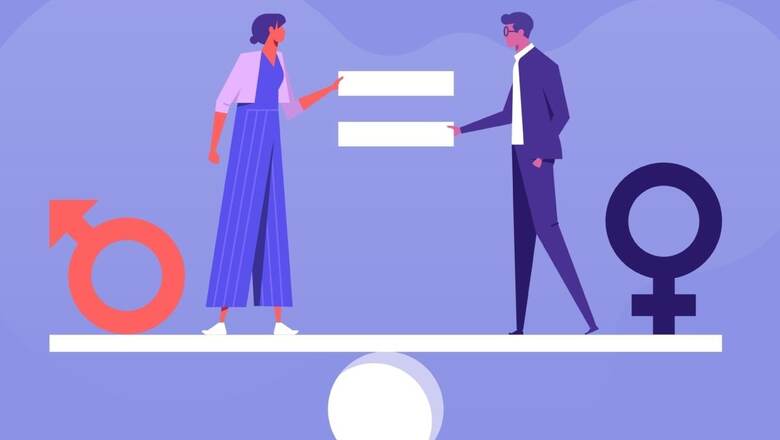
views
It is accepted wisdom that enhancing women’s agency or sense of control over their lives is a cornerstone of gender equality. Yet the everyday discussions about gender and more recently, women’s workforce participation in the Indian context, rely on a narrow vision of women’s agency, which sees only some outcomes as representative of gender equality. This not only imposes a predefined benchmark of gender equality, which may have little bearing on how women themselves perceive gender equality, but it reduces the complexity of how people navigate social norms and interpersonal relationships to neatly defined outcomes. I call this discourse political gender equality.
It fails to ask fundamental questions such as: how do different women define empowerment? Do Indian women perceive their workforce participation as conducive to their empowerment? Political gender equality is pervasive not just across international organisations and NGOs working on gender issues but also in our everyday parlance and media discourses. The danger of this discourse lies in perpetuating myths of gender equality that displace women’s voices and replace them with an amorphous ideology, which is widely consumed and rarely questioned. This discourse operates against its stated objective to facilitate gender equality by privileging a worldview rather than the needs and preferences of women.
Political Gender Equality
An important implication of focusing on enhancing women’s workforce participation is the exclusion of other pathways to gender equality. A woman’s preference to work from home to be a more hands-on mother and reduce outsourcing care work is also a credible pathway to gender equality. However, it is often denigrated or overlooked in discussions of political gender equality that uphold women’s workforce participation as a worthy goal to empower women and allow them to combat patriarchal oppression.
This convenient equation between workforce participation and reduction in patriarchal oppression presents patriarchal oppression as a zero-sum game and overlooks the continual negotiation around patriarchal structures, which is aided by many factors, one of which in select cases may be women’s workforce participation. But women have been negotiating patriarchal structures much before the advent of paid work, relying on their knowledge, negotiating ability, adaptability, and interpersonal skills. It is no coincidence that these are also the traits that predict workplace success. More importantly, women exercise their agency in ways that may not align with the goals of political gender equality.
Working women are also mothers, wives, and daughters and are embedded in and actively partaking in a community system. They are balancing collective aspirations for being a good mother and wife with individualised aspirations for financial independence. These are neither competing goals nor are they unique to women; men are engaging in a similar balancing act. The narrow prism of political gender equality negates the similarity between men and women and how they work together to build households, communities, and society. Instead, it pitches men and women against each other and reduces their interaction to an equitable division of household chores.
This discourse is not just inaccurate, it is dangerous when passed on to young women and men. It encourages them to think of members of the opposite sex as enemies that must be beaten or submitted to rather than collaborative partners. The obsession with equality seeps into how we evaluate work done by partners in a relationship and promotes an accounting system that is antithetical to a healthy partnership.
Social Norms
According to the political gender equality framework, the low workforce participation of women is a problem attributed to patriarchal social norms. Consequently, women’s low workforce participation must be resolved by a) a more equitable division of household labour and b) ‘fixing’ social norms that restrict female mobility. There are two problems with this diagnosis. Working mothers across the world, especially in India, articulate that their primary concern is managing childcare duties. An FSG study that surveyed 6600 women in low-income households across urban and rural India found that 89 per cent of women with children under 12 are unwilling to use paid and non-familial childcare facilities, irrespective of their cost. A large portion also believe that caring for the children is their primary responsibility.
It appears that for women with children, their workforce decisions are guided by their aspiration to be more physically present for their children. This recognition can lead to responsive policies such as flexible and remote work options for women. It can also lead to a more informed debate about the merits of family-friendly policies at the workplace for anyone who wants to achieve better work-life balance.
The targeting of non-Western social norms as a “problem” not only reeks of racism, but it evaluates social norms purely based on political ideas of gender equality, discounting the ways social norms operate along multiple dimensions to enhance social support, security, and mental well-being in family-oriented societies.
In addition, my work with young unmarried women in Punjab and Haryana reveals that women typically do not attempt to override social norms that restrict their physical mobility. While young women articulate a strong desire for paid work, they adapt and negotiate around familial expectations. Thus, identifying agency only in rebellious and individualistic decisions, that entail going against the social and cultural systems women belong to, is not representative of how most people, let alone women, navigate social norms.
This misdiagnosis of women’s low workforce participation rates is one in a series of fallacies that are rampant in everyday discussions of gender equality. Discussions about gender insofar, as they are concerned with the well-being of women and larger society, cannot get caught up in political projects of gender equality. It must take women’s expressed preferences and aspirations as a starting point not only for policy and development programs but also to initiate a more reasonable conversation on gender equality.
The author is Associate Professor, School of International Affairs, O.P. Jindal Global University. Views expressed in the above piece are personal and solely that of the author. They do not necessarily reflect News18’s views.




















Comments
0 comment